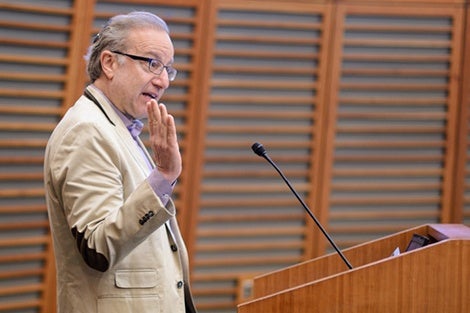A genome every 12 minutes

Isaac Kohane of Harvard Medical School speaking at the PQG conference. Photo by Shaina Andelman
Conference on whole genome sequencing addresses advances in technology, ‘fake diseases,’ ancient DNA, and broad opportunities for human disease research
In 2006, in the early days of whole genome sequencing, the sequencing platform at the Broad Institute of Harvard and MIT was able to sequence just three genomes — for an elephant, a tick, and a rabbit.
This year, the team is on pace to generate about 75,000 whole human genomes and will bring the total number of human exomes — the complete set of human genes — sequenced to over 250,000.
That’s a new genome every 12 minutes — a treasure of valuable data that is helping to shed light on genetic factors in human diseases.
The work at the Broad is part of an ongoing collaborative large-scale national whole genome sequencing effort. The Genome Sequencing Program (GSP) of the National Human Genome Research Institute (NHGRI) is sequencing 200,000 whole human genomes. The Trans-Omics Precision Medicine Program (TOPMed) of the National Heart, Lung and Blood Institute (NHLBI) is sequencing 100,000–150,000 whole human genomes.
“Such massive whole genome sequencing data present an unprecedented opportunity for genetic discovery in human diseases, with the most comprehensive capture of the human genome,” said Xihong Lin, chair of Harvard Chan School’s Department of Biostatistics and the contacting principal investigator of the NHGRI GSP Harvard Analysis Center.
The huge upswing in sequencing activity over the past few years was one of the topics discussed at the recent PQG (Program in Quantitative Genomics) Conference sponsored by Harvard T.H. Chan School of Public Health on Nov. 3–4.




